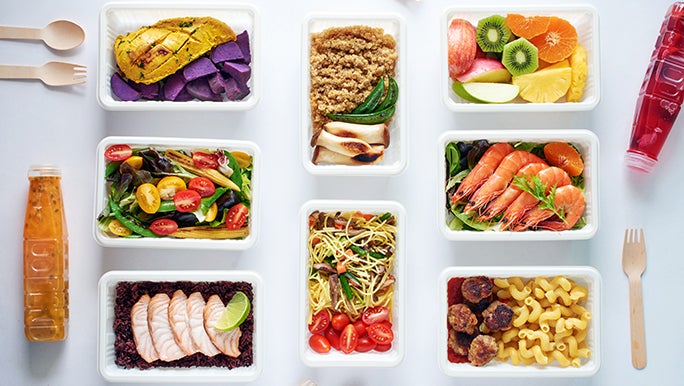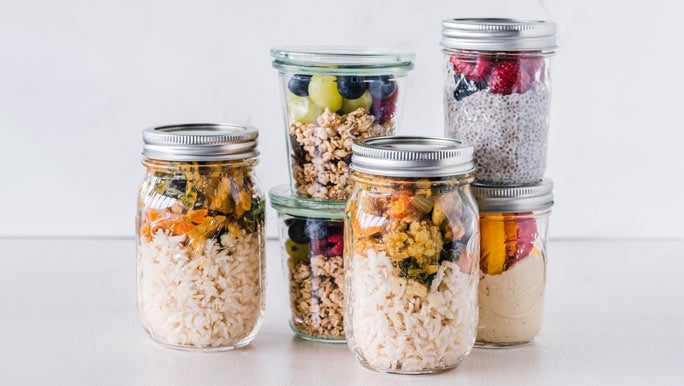A meal plan is, quite simply, a plan of your meals – an overview of what you'll eat on a daily, weekly or monthly basis. Meal planning can be an effective way to try to make your diet fit with your budget, time constraints and health goals.
But trying to create the perfect plan for your entire family can become overwhelming. You may find yourself asking questions like:
- Do I need to create a meal plan for every single meal?
- Do I need a special app?
- Do I need a dietitian to make me a meal plan?
- Do meal plans even work?
Dietitian and Nutritionist, Lyndi Cohen opens up about why she likes meal plans, why she finds them effective, and her top tips for making a plan that works for you.

Meal planning, even if it’s only for dinners, may help to relieve your mental load.
How to make a workable meal plan: 5 top tips
1. Ensure the plan fits your schedule
An effective meal plan needs to fit in with your life. Before you start planning, get your diary out so you can plan meals around any events.
2. Shop from your pantry first
Check what you already have in the fridge, freezer, and pantry before beginning to plan. That way, when you write up your shopping list, you won’t buy anything you already have.
Eating veggies for the seasons (plus 4 budget saver tips)
Seasonal eating is a seriously smart thing to do. There are oh-so-many wonderful benefits from eating seasonal produce including veggies and fruit.
3. Keep it simple
Lyndi’s biggest tip if you’re new to meal planning is not to go overboard with new recipes. “Introduce one new recipe each week,” she recommends. “This helps you to avoid getting stuck in a boring food rut, but ensures that any challenging new recipes don’t feel so overwhelming.”
4. Get the family involved in weekly meal plans
Including family favourites and allowing kids to choose meal ideas ensures your family will be happy with the final plan. And depending on their age, kids can also help with some of the prep work – involving them helps them to form healthy habits early on.
5. Plan using the right tools for you
You can keep meal planning really simple with nothing but a notepad and pencil. However, if you like a bit of tech, you can also use your computer or even a specific app to help.
For example ‘Back to Basics’ is the app Lyndi developed to simplify meal planning.
“You click a button and the app automatically generates your planner for you,” says Lyndi. “Swap out any recipes that you don't like, then click another button to add all the ingredients from the recipes to your Woolworths online shopping cart.”
Because a dietitian developed the app, using it is like having a dietitian make your meal plan for you. Shopping online can also give you ideas for easy snacks to add to your cupboard without the temptation of sweet things at the check-out.
Just remember, for individual advice, you should speak to your GP or a dietitian.
Why do meal plans work?
Lyndi starts by recognising that having to decide what to make for dinner every night can be mentally exhausting, especially when we all lead busy lives.
She says that meal planning, even if it’s only for dinners, may help to relieve that mental load. It may also:
- Save you time and money. Knowing the ingredients you need up front makes shopping time more focused, so you’re less likely to impulse buy. Plus, prepping ingredients in advance means you can throw dinner together much quicker, getting food to hungry tummies sooner.
- Increase the variety in your diet. Meal plans allow you to strategically add in new (or extra) foods with specific nutrients that can make you feel better.
- May help you to stick to health goals. Planning your meals may help you to stick to any goals you have. That’s true whether you want to eat more green veggies or include better vegetarian sources of protein.
- Reduce wasted food. Buying only what you need means you’re less likely to throw food out. It may also help you to stop impulse buying foods that sound good, only to end up in the back of the fridge.
- May help you to stop eating junk food. Knowing that all the prepped ingredients for dinner are ready to go makes you less likely to swing by the drive-thru on your way home.
Long-term meal planning
Lyndi says that a common meal planning mistake people make is trying to come up with a recipe for every meal, everydevelop day.
“It's very easy to stick to a meal plan that tells you what to eat religiously for a few days. But ultimately, we need to find meal plans that we can live on for the rest of our lives,” she adds.
So make sure you include some easy, convenient meals for days when time is really limited. Healthier takeaway options can give you a night off from cooking, and offers the whole family a treat to look forward to.

Don’t go overboard with new recipes, simply introduce one new recipe each week to avoid overload.
Meal planning isn’t about perfection
Meal planning may help to make your life run more smoothly and easily, but it's OK if you don't stick to your plan every day.
Once you get into your planning groove, you’ll be able to make the process work even more effectively for you. You’ll know the meals that work best for your family, which will help to ensure that your diet is as balanced and healthy as possible.
A simple tool to provide insight into your shopping habits and inspiration to make healthier choices
Check out healthylife Food Tracker - a simple tool to help inspire you to make healthier food choices and achieve a more balanced diet.
Related:
Lyndi Cohen is a media Nutritionist and Dietitian who regularly appears on Aussie TV screens and in magazines with the goal of reaching as many people as possible. She is all about cutting through the sea of wellness misinformation with common sense and scientific data.
Reviewed by the healthylife Advisory Board July 2021.




